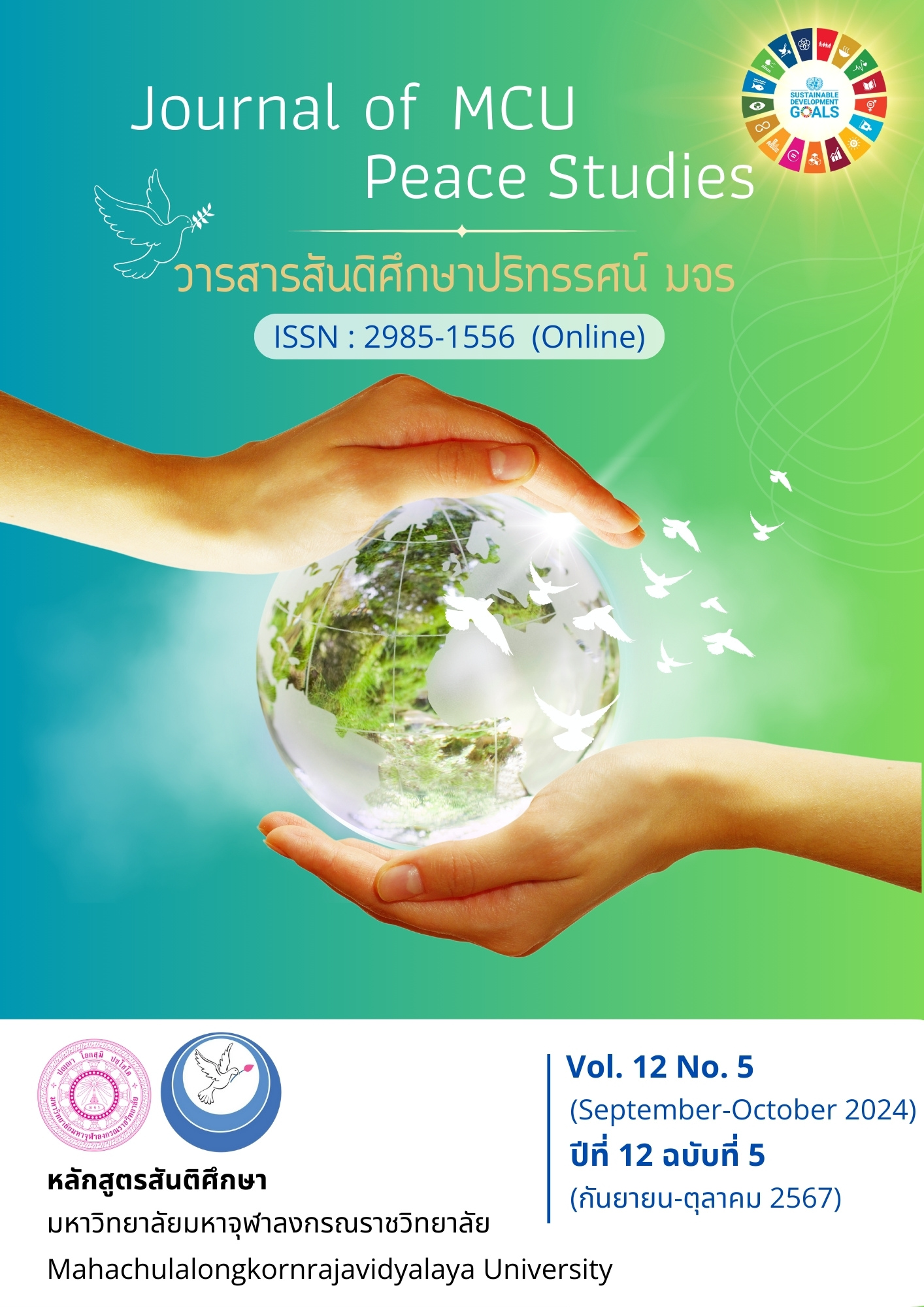ผลกระทบของการเปลี่ยนแปลงนวัตกรรมการเงินที่มีผลต่อสถาบันทางการเงินไทย ในศตวรรษที่ 21
Main Article Content
บทคัดย่อ
การเปลี่ยนแปลงนวัตกรรมทางการเงินเป็นโอกาสสำคัญสำหรับสถาบันการเงินไทยในการเติบโตและพัฒนา แต่ในขณะเดียวกันก็เป็นความท้าทายที่สถาบันการเงินต้องเตรียมพร้อมรับมือ สถาบันการเงิน ที่สามารถปรับตัวและนำนวัตกรรมมาใช้ได้อย่างมีประสิทธิภาพ จะสามารถสร้างความได้เปรียบในการแข่งขันและเติบโตอย่างยั่งยืน นวัตกรรมการเงินที่มีผลต่อสถาบันทางการเงินไทยในศตวรรษที่ 21 ที่น่าสนใจ คือ Robotic Process Automation (RPA) บทความวิชาการนี้มีวัตถุประสงค์เพื่อศึกษาผลกระทบของการเปลี่ยนแปลงนวัตกรรมการเงินที่มีผลต่อสถาบันทางการเงินไทยในศตวรรษที่ 21 ที่เป็นการวิเคราะห์เชิงเนื้อหา (Content Analysis) พบว่า ผลกระทบของการเปลี่ยนแปลงนวัตกรรมการเงิน คือ Robotic Process Automation (RPA) ที่มีผลต่อสถาบันทางการเงินไทยในศตวรรษที่ 21 ได้แก่ การเพิ่มประสิทธิภาพในการทำงาน การลดต้นทุน การปรับปรุงคุณภาพบริการ การสร้างนวัตกรรมใหม่ ๆ และการปรับตัวให้เข้ากับยุคดิจิทัล จากข้อค้นพบดังกล่าว มีประโยชน์ คือ การนำ Robotic Process Automation (RPA) มาใช้ในสถาบันการเงินไทยเป็นการลงทุนที่คุ้มค่า เพิ่มประสิทธิภาพของระบบทางการเงิน เพราะนอกจากจะช่วยให้สถาบันการเงินมีขีดความสามารถในการแข่งขันมากขึ้นแล้ว ยังเป็นการส่งเสริมการเติบโตของเศรษฐกิจโดยรวมอีกด้วย
Article Details

อนุญาตภายใต้เงื่อนไข Creative Commons Attribution-NonCommercial-NoDerivatives 4.0 International License.
ทัศนะและความคิดเห็นที่ปรากฏในบทความในวารสาร ถือเป็นความรับผิดชอบของผู้เขียนบทความนั้น และไม่ถือเป็นทัศนะและความรับผิดชอบของกองบรรณาธิการ ยินยอมว่าบทความเป็นลิขสิทธิ์ของวารสาร
เอกสารอ้างอิง
Asairat, K. (2023). Applying Robotic Process Automation in Energy Supply Chain Organizations in Thailand. (Master’s Thesis). Thammasat University. Bangkok.
Asatiani, A., & Penttinen, E. (2016). Turning Robotic Process Automation into Commercial Success-Case Opus Captica. Journal of Information Technology Teaching Case, 6(2), 1-12.
Axmann, B., & Harmoko, H. (2020). Robotic Process Automation: An Overview and Comparison to Other Technology in Industry 4.0. 10th International Conference on Advanced Computer Information Technologies (ACIT) (pp. 559-562). Piscataway, New Jersey: IEEE.
Bangkok Bank Public Company Limited. (2022). Bangkok Bank Opens 3 Opportunities for Further Cooperation Hong Kong-ASEAN. Retrieved November 3, 2022, from https://www.bangkokbank.com/th-TH/About-Us/News-and-Media/News-Detail?ID=F5 BC6A91-2AFA-43C2-9066-6FC8EDCDA276&Tag=New
Bank of Thailand. (2022). 22 Answers to Comprehend the Future of Thailand Financial Economy. Retrieved February 1, 2022, from https://www.bot.or.th/content/dam/bot/documents/th/news-and-media/news/2022/n0665t_qa.pdf
Bruno, J., Johnson, S., & Hesley, J. (2017). Robotic Disruption and the New Revenue Cycle: Robotic Process Automation Represents an Immediate New Opportunity for Healthcare Organizations to Perform Repetitive, Ongoing Revenue Cycle Processes More Efficiently and Accurately. Retrieved December 12, 2022, from https://www.hfma.org/finance-and-business-strategy/innovation-and-disruption/55353/
Featherman, M. S., & Pavlou, P. A. (2003). Predicting E-services Adoption: A Perceived Risk Facets Perspective. International Journal of Human-Computer Studies, 59(4), 451-474.
G-Able. (2023). RPA: Long-Term Cost Savers Work Smarter in Digital Age. Retrieved December 12, 2023, from https://www.g-able.com/th/insights/what-is-rpa
Hashdork.com. (2024). Introduction to Robotic Process Automation (RPA). Retrieved April 25, 2024, from https://hashdork.com/th/robotics-process-automation-rpa/
Kaewjamrat, Y. (2021). DeFi: A New Type of Financial Service that Shakes up Financial Institutions. Retrieved December 7, 2021, from https://www.nsm.or.th/nsm/th/node/6408
Lacity, M., Willcocks, L. P., & Craig, A. (2017). Service Automation: Cognitive Virtual Agents at SEB Bank. The Outsourcing Unit Working Research Paper Series (17/01). London, UK: London School of Economics and Political Science.
McKinsey & Company (2022). Emerging Consumer Trends in a Post COVID 19 World. Retrieved September 17, 2024, from https://www.mckinsey.com/capabilities/growth-marketing-and-sales/our-insights/emerging-consumer-trends-in-a-post-covid-19-world
Meksuwan, W. (2022). Innovation and Technologies for Human Resource Development. (2nd ed.). Bangkok: Ramkhamhaeng University.
Mendling, J. et al. (2018). How Do Machine Learning, Robotic Process Automation, and Blockchains Affect the Human Factor in Business Process Management? Communications of the Association for Information Systems, 43, 1-23.
Menthaka, P. (2021). The Application of Robotic Process Automation Affecting Operational Risks: Case Study of Funds Transfer Payment Operations at Commercial Bank in Thailand. (Master’s Thesis). Thammasat University. Bangkok.
Mingsakul, P. (2023). Technology Trends in Banking in 2023. Retrieved February 16, 2023, from https://www.krungsri.com/th/research/research-intelligence/tech-trend-2023
Momkaew, Ch. (2022). RPA Technology: Digital Workers of Future World. Retrieved January 12, 2023, from https://www.chula.ac.th/news/94172/
Mongtangdan, D. (2018). Financial and Banking Trends in the 21st Century (3): Focus on Personalized Service and the Use of Machines Instead of People More. Retrieved March 22, 2024, from https://drdancando.com/แนวโน้มการเงินการธนาคา/
Nittayakamolphun, P. (2022). The Financial Technology Transformation and Effects on the Efficiency of Commercial Banks in Thailand. (Doctoral Dissertation). Maejo University. Chiang Mai.
Panyatrilak, S. (2018). Efficiency of Using Robotic Process Automation (RPA) System: Case Study Airport Tax Refund of an Airline. (Master’s Thesis). Ramkhamhaeng University. Bangkok.
Ringim, K. J., Razalli, R., & Norlena, H. (2015). The Relationship between Information Technology Capability and Organizational Performance in Nigerian Banks. International Journal of Business Research and Development, 4(2), 1-10.
Satti, M. K., & Irum, S. (2014). The Moderating Effect of IT Capability on the Relationship between Business Process Reengineering Factors and Organizational Performance of Bank. European Journal of Business and Management, 6(37), 1-21.
Singpong, J. (2023). Employees Attitude in SCG JWD Logistics Group towards Applying Robotic Process Automation (RPA) Technology in Company. Retrieved December 7, 2023, from https://mmm.ru.ac.th/MMM/IS/vlt16/6414991215.pdf
Sornnurak, Ch. (2020). The Application of Robotic Process Automation (RPA) in Opentions Support for the Competitive Advantage in Thai Commercial Banking Industry: Case Study of ABC Bank Operation Group. (Master’s Thesis). Prince of Songkla University. Songkla.
Willcocks, L., Lacity, M., & Craig, A. (2015). The IT Function and Robotic Process Automation. The Outsourcing Unit Working Research Paper Series (pp. 1-39). London School of Economices and Political Science, Research Online Documents on Economics. Retrieved March 9, 2024, from https://eprints.lse.ac.uk/64519/1/OUWRPS_ 15_05_published.pdf
Winactorsupport.com. (2023). RPA-The Powerful Tool in Banking Industry. Retrieved December 7, 2023, from https://winactorsupport.com/th/rpa-the-powerful-tool-in-banking-industry/
Wonglimpiyarat, J. (2018). Financial Innovation System towards Technology Commercialization. (2nd ed.). Bangkok: Thammasat University Press.


